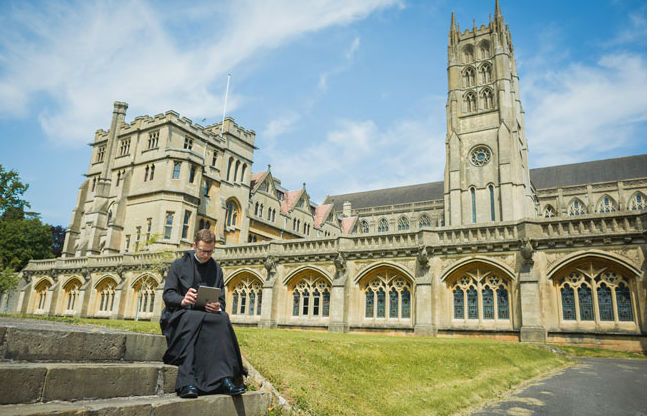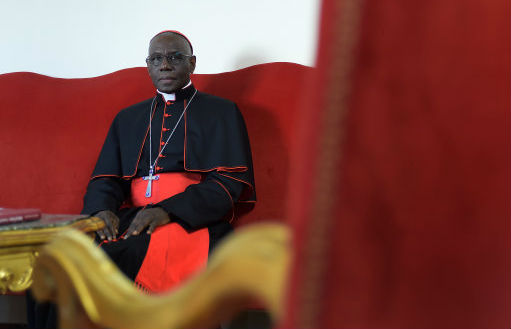Pope Francis has issued an unusual public correction of his liturgy prefect over his attempts to water down a new papal directive handing more power to local bishops over liturgical translations.
It is the Pope’s second rebuke of Cardinal Robert Sarah, the Prefect of the Congregation for Divine Worship and Discipline of the Sacraments, who has found himself increasingly at odds with the direction of Francis’ papacy.
Now, in a letter sent to the cardinal and released by the Vatican, the Pope corrects an article written by the 72-year-old Guinean prelate arguing his department retains the power to “impose” certain translations of the Roman Missal from latin into local languages.
Such an interpretation, the Pope writes, is wide of the mark with Francis stressing translations “should not lead to a ‘imposition’ to the Episcopal Conferences of a given translation made by the Dicastery, as this would undermine the right of the bishops.”
With the decree “Magnum Principium”, Francis ruled that local hierarchies were being given this translation task as this was the intention of the Second Vatican Council, the 1962-65 gathering which set the blueprint for the contemporary Church.
But in his article in French Catholic publication “L’Homme Nouveau” the cardinal likened the relationship between the Holy See and bishops over translations to that of a parent and children’s homework or a professor towards a student preparing a thesis while stressing Vatican approval for new translations is by no means a “formality.”
In his letter to the liturgy prefect, the 80-year-old Jesuit Pope says the Holy See is not required to undertake “a detailed word-by-word examination” except in “obvious cases” while it is the job of Cardinal Sarah and his team to provide a “confirmation” of translations, as is set out by the new law.
Given that Sarah distributed his article to various websites, Francis “kindly” asks that he provides the letter to “the same sites” and to bishops conferences, members and consulters of his department.
The Pope also explains that his law now grants bishops’ conferences the right to judge “authenticity and consistency of one and the other terms in translations” in a process which should take place in “dialogue with the Holy See.”
Crucially, the Pope makes clear that new Mass texts no longer need to conform with “Liturgiam Authenticam”, the Congregation for Divine Worship’s 2001 document which called for more literal translations of the Latin into the vernacular. Cardinal Sarah, however, had stressed that this directive still stands and there is “no noticeable change regarding the imposed standards” set out by that text.
“Liturgiam Authenticam” was a controversial ruling which many saw as responsible for producing clunky, and overly latinate translations. Such criticisms were levelled at the 2011 English Roman Missal while Cardinal Reinhard Marx, the President of the German Bishops’ Conference, described “Liturgiam Authenticam” as a “dead end” which took “too narrow a view”.
Backing up the position of Cardinal Marx, the Pope stresses to Cardinal Sarah that his new law aims to "repeal the practice adopted by the dicastery following Liturgiam Authenticam.”
In July of last year, Francis publicly corrected the cardinal after he suggested priests should turn east and celebrate Mass "ad orientem” while has recently stressed that the liturgical reforms of Vatican II are “irreversible”.
The Pope’s letter sent to the cardinal was released by the Vatican on the feast day of Saint John Paul II, in a sign of Francis’ desire for continuity with his Polish predecessor.
Cardinal Sarah later tweeted a picture of John Paul II asking for his prayers, while also retweeting an article in Polish which discusses the rights of countries to distinguish between economic migrants and refugees.
Francis has called on European countries to open their doors to migrants, making the plight of refugees a key theme of his papacy.
Through books and lectures Cardinal Sarah has generated a following in the United States, France and parts of Africa, and is respected for his austere, monastic-style spirituality.
He was opposed to moves allowing divorced and remarried Catholics to receive communion during the 2014 and 2015 synod of bishops gatherings, while in a speech during the 2015 assembly likened “homosexual and abortion ideologies” to Islamic extremism and 20th century Fascism and Communism.



 Loading ...
Loading ...